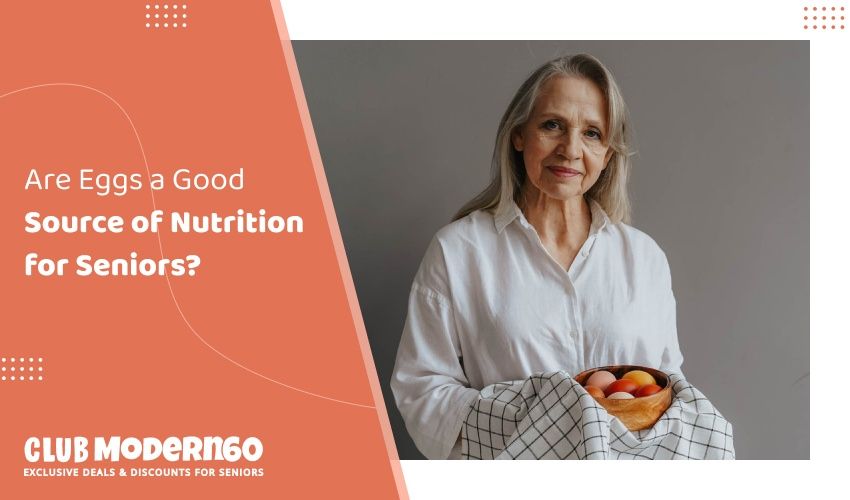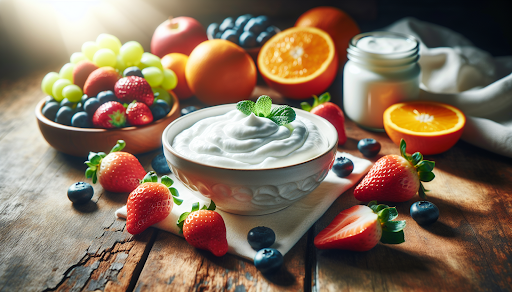Acute and chronic cough: Causes and treatment
Cough is mainly a reflex of the body to get rid of throat irritants in the air passage. Cough can be caused due to infections or viral fevers, but can also be one of the symptoms of diseases related...

Have you ever wondered, “Are eggs bad for seniors?” With their high nutritional value and versatile cooking options, eggs can offer various health benefits for older adults. However, it’s essential to understand the impact of cholesterol on heart health and make informed decisions about egg consumption. In this blog post, we’ll discuss the advantages of eggs for seniors, address cholesterol concerns, provide guidelines for egg consumption, and explore alternatives to whole eggs.

Eggs are a powerhouse of essential nutrients that can greatly benefit seniors. They are low in saturated fat and offer high-quality protein, B vitamins, and vitamin D, which contribute to muscle maintenance, cognitive function, and bone health, respectively. Notably, a single large egg offers about 6 grams of protein, which aids in reducing muscle loss and enhancing muscle strength and function in older adults. Therefore, it’s a good idea for seniors to eat eggs as a part of their balanced diet.
So, are eggs beneficial for seniors? Definitely! However, moderation is the key, as will be discussed later.
As we age, maintaining muscle mass and strength becomes increasingly important for mobility and overall health. Protein, which eggs are rich in, is instrumental in maintaining muscle health. Consuming too many eggs, however, may have an impact on cholesterol levels, which is why it’s recommended for seniors to eat 1-2 eggs daily, depending on their cholesterol intake and cardiovascular health.
The suggested daily protein intake for seniors is between 1.2 and 2.0 grams per kilogram of body weight or 20 to 30 grams of protein per meal, along with 12 to 15 grams per snack, for optimal muscle health. Being a complete protein source with all essential amino acids in the correct ratios, eggs serve as a nourishing choice for preserving muscle health.
Another vital aspect of senior health is cognitive function, with B vitamins significantly aiding in brain health support. Research suggests that B vitamin supplementation, such as folic acid, B12, and B6, can slow down cognitive decline, improve memory, and prevent the decline of global cognitive function in seniors. Eggs are a beneficial source of B vitamins, particularly vitamins B6 and B12, which are known to reduce the risk of dementia and support brain development.
Although some studies have conflicting results, the overall evidence suggests that B vitamins found in eggs may help prevent age-related cognitive decline and support cognitive function. Hence, moderate consumption of eggs can be a tasty method to enhance brain health for seniors.
As we age, Vitamin D becomes indispensable for bone health, and eggs serve as a commendable source of this critical nutrient. A large egg contains approximately 11% of the daily value of vitamin D. Consuming up to seven eggs per week can provide seniors with a good source of vitamin D, contributing to overall bone health.
Aging is associated with a decrease in vitamin D absorption, likely due to a reduction in the skin’s production of vitamin D and a decrease in calcium absorption. Inclusion of eggs in the diet aids seniors in maintaining sufficient vitamin D levels, critical for preserving bone health and minimizing the risk of fractures and osteoporosis.

Awareness about cholesterol concerns is vital for seniors, given that eggs can alter LDL and HDL cholesterol levels, thereby influencing heart health. Research suggests that consuming eggs on a daily basis may be associated with an increased risk of developing heart disease due to an effect on LDL and HDL cholesterol levels. However, the relationship between egg consumption and cholesterol levels is complex and may vary from person to person.
For a better understanding of the influence of eggs on seniors’ heart health, it would be beneficial to examine:
LDL cholesterol, or low-density lipoprotein cholesterol, is often referred to as ‘bad’ cholesterol. It is a type of cholesterol that can accumulate in the arteries and increase the risk of cardiovascular disease. High levels of LDL cholesterol are associated with a heightened risk of cardiovascular disease in seniors, as the buildup of plaques in the arteries can cause atherosclerosis, potentially restricting blood flow and increasing the risk of heart disease and stroke.
For seniors, LDL cholesterol levels should ideally be below 100 mg/dL, while levels above 130 mg/dL are typically deemed high. Factors that may contribute to increased LDL cholesterol levels in seniors include:
HDL cholesterol, which is also present in eggs, aids in protecting against heart disease by eliminating detrimental cholesterol from the bloodstream. Some studies have indicated that consuming eggs may increase the LDL/HDL ratio and LDL cholesterol levels, while others have found that moderate egg consumption can improve both LDL and HDL levels and the LDL-to-HDL ratio. The relationship between HDL cholesterol and eggs continues to be a subject of debate and may depend on individual sensitivity to dietary cholesterol.
The ideal HDL cholesterol level for seniors is above 60 mg/dL. By choosing heart-healthy cooking methods and incorporating other cholesterol-friendly foods into their diet, seniors can enjoy the benefits of eggs while maintaining optimal cholesterol levels.
Seniors ought to adhere to precise egg consumption guidelines, which are based on their cholesterol levels and heart disease risk. For those with normal cholesterol levels, the 2019 science advisory suggests including up to one whole egg or its equivalent in their diets daily. It’s worth noting that most current studies suggest consuming one egg daily does not have a significant impact on blood cholesterol levels.
For seniors with high cholesterol or at risk of heart disease, it’s advisable to restrict their egg consumption to 3-4 whole eggs per week and consider other low-cholesterol protein sources. Monitoring their dietary cholesterol intake is essential for maintaining a healthy lifestyle.
If a senior has normal cholesterol levels, which are generally accepted to be below 200 mg/dL, they can safely consume one whole egg per day as part of a balanced diet. Most current epidemiologic studies support the daily consumption of one whole egg in healthy individuals, and the American Heart Association also concurs with this recommendation.
However, some studies suggest a positive association between whole egg and cholesterol intake with all-cause, cardiovascular disease and cancer mortality. It is essential to consider individual health conditions and consult with a healthcare professional for personalized dietary recommendations.
How many eggs should seniors with high cholesterol or heart disease risk consume? Limiting their egg intake to 3-4 whole eggs per week is recommended. This approach can help reduce the risk of elevated LDL cholesterol levels, which can contribute to the development of cardiovascular disease.
It’s also important for seniors to explore other low-cholesterol protein sources, such as:
These alternatives can provide essential nutrients and support overall health while keeping cholesterol levels in check.

For seniors looking to limit their whole egg consumption or cholesterol intake, there are alternatives to consider, such as egg whites and other nutritious foods. Egg whites are low in calories and cholesterol, yet high in protein, making them a suitable option for seniors with high cholesterol or heart disease risk.
In addition, there are other nutrient-dense foods that can be incorporated into seniors’ diets for a balanced and heart-healthy approach.
Egg whites provide a low-cholesterol option for seniors while still offering protein and other essential nutrients. With no cholesterol content and approximately 4 grams of protein per serving, egg whites can be a nutritious alternative to whole eggs.
Integrating egg whites into seniors’ diets enables them to relish the advantages of eggs without the extra cholesterol found in the egg yolk, making it an optimal choice for those with high cholesterol or a risk of heart disease.
Beyond egg whites, seniors can include other nutrient-rich foods in their diets for a balanced approach. Lean meats, such as chicken, turkey, and lean cuts of beef, are excellent sources of protein and essential nutrients like iron, zinc, selenium, and B vitamins. Seafood, particularly salmon, cod, mackerel, and tuna, is rich in omega-3 fatty acids, which are known to be beneficial for brain and heart health.
Legumes, such as lentils, chickpeas, and beans, offer numerous nutritional benefits, including:
Incorporating these alternatives into seniors’ diets can help them maintain a balanced and heart-healthy lifestyle.

To make the most of the health benefits offered by eggs, seniors can incorporate them into a healthy diet by using heart-healthy cooking methods and combining them with other nutritious foods. Boiling, poaching, or scrambling with minimal oil are suggested cooking techniques for seniors to relish eggs without incorporating unhealthy fats.
Pairing eggs with heart-healthy foods, such as whole grains, vegetables, and healthy fats, can create a balanced and nutritious meal for seniors.
Boiling an egg is a simple and nutritious way to enjoy its benefits without adding unnecessary fats or calories. Poaching is another healthy option that doesn’t require oil, as the egg is cooked gently in water. Scrambling eggs with a minimal amount of oil or using a non-stick pan can also help seniors prepare their eggs without adding unhealthy fats.
Opting for these heart-friendly cooking techniques allows seniors to enjoy the flavor and nutritional advantages of eating eggs while preserving a balanced and cholesterol-friendly diet.
Complementing eggs with heart-healthy foods can result in a balanced and nourishing meal for seniors. Some examples of heart-healthy foods to pair with eggs include whole grains like oatmeal or whole-wheat toast, vegetables such as spinach, tomatoes, or bell peppers, and healthy fats like avocado or olive oil.
Combining eggs with these nutritious ingredients not only enhances the flavor but also provides seniors with a well-rounded meal that supports their overall health and well-being.
In conclusion, eggs can be a beneficial addition to a senior’s diet, providing essential nutrients for muscle maintenance, cognitive function, and bone health. However, it’s crucial to understand the impact of cholesterol on heart health and consume eggs in moderation based on individual cholesterol levels and heart disease risk.
By choosing heart-healthy cooking methods, incorporating egg whites or other low-cholesterol protein sources, and pairing eggs with nutrient-dense foods, seniors can enjoy the benefits of eggs while maintaining a balanced and heart-healthy lifestyle.
For healthy elderly people, the National Heart Foundation currently sets no limit on how many eggs they can eat per day. Therefore, it is OK for the elderly to have one egg a day as part of any balanced diet.
Eggs provide high-quality protein and important nutrients such as vitamin D, omega-3 fatty acids, and leucine, which are essential for maintaining good health in senior citizens. They are also easily prepared, digestible, and economical, making them an ideal food for older adults.
For seniors, eating up to two eggs a day is generally considered safe. However, those with high cholesterol or other heart disease risk factors should stick to no more than 4-5 eggs per week. Eating eggs provides a variety of nutrients and is economical, easily prepared, and soft in texture making them an ideal food for older adults.
Seniors should avoid fried foods, processed meats, added sugars, alcohol, and high-sodium foods as they can increase the risk of heart disease, stroke, and other serious health conditions.
Seniors with normal cholesterol levels should consume one whole egg per day as part of a healthy diet.

Brenda is a Registered Dietitian and health coach with over nine years of clinical experience. But besides being a registered dietitian, she has certifications in sports nutrition, precision nutrition, diabetes education, women’s health specialist, fertility advisor, and gut health.


Unlock expert insights and tips with our exclusive ebook. Enter your email to get your free copy.
Please check your email for a welcome message from Modern60. If it's not in your inbox, kindly check your spam or junk folder
There are no comments yet